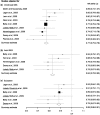Intelligence in youth and all-cause-mortality: systematic review with meta-analysis
- PMID: 21037248
- PMCID: PMC3147066
- DOI: 10.1093/ije/dyq190
Intelligence in youth and all-cause-mortality: systematic review with meta-analysis
Abstract
Background: A number of prospective cohort studies have examined the association between intelligence in childhood or youth and life expectancy in adulthood; however, the effect size of this association is yet to be quantified and previous reviews require updating.
Methods: The systematic review included an electronic search of EMBASE, MEDLINE and PSYCHINFO databases. This yielded 16 unrelated studies that met inclusion criteria, comprising 22,453 deaths among 1,107,022 participants. Heterogeneity was assessed, and fixed effects models were applied to the aggregate data. Publication bias was evaluated, and sensitivity analyses were conducted.
Results: A 1-standard deviation (SD) advantage in cognitive test scores was associated with a 24% (95% confidence interval 23-25) lower risk of death, during a 17- to 69-year follow-up. There was little evidence of publication bias (Egger's intercept = 0.10, P = 0.81), and the intelligence-mortality association was similar for men and women. Adjustment for childhood socio-economic status (SES) in the nine studies containing these data had almost no impact on this relationship, suggesting that this is not a confounder of the intelligence-mortality association. Controlling for adult SES in five studies and for education in six studies attenuated the intelligence-mortality hazard ratios by 34 and 54%, respectively.
Conclusions: Future investigations should address the extent to which attenuation of the intelligence-mortality link by adult SES indicators is due to mediation, over-adjustment and/or confounding. The explanation(s) for association between higher early-life intelligence and lower risk of adult mortality require further elucidation.
Figures





Comment in
-
Commentary: Intelligence in youth and all-cause mortality: some problems in a recent meta-analysis.Int J Epidemiol. 2011 Jun;40(3):644-6. doi: 10.1093/ije/dyr079. Epub 2011 May 6. Int J Epidemiol. 2011. PMID: 21551224 No abstract available.
References
-
- Batty GD, Deary IJ, Gottfredson LS. Premorbid (early life) IQ, and later mortality risk: systematic review. Ann Epidemiol. 2007;17:278–88. - PubMed
-
- Leon DA, Lawlor DA, Clark H, Batty GD, Macintyre S. The association of childhood intelligence with mortality risk from adolescence to middle age: findings from the Aberdeen Children of the 1950s cohort study. Intelligence. 2009;37:520–28.
-
- Batty GD, Wennerstad KM, Smith GD, et al. IQ in early adulthood and mortality by middle age: Cohort study of 1 million Swedish men. Epidemiology. 2009;20:100–9. - PubMed
-
- Hart CL, Taylor MD, Davey Smith G, et al. Childhood IQ, social class, deprivation, and their relationships with mortality and morbidity risk in later life: Prospective observational study linking the Scottish Mental Survey 1932 and the Midspan studies. Psychom Med. 2003;65:877–83. - PubMed
-
- Arvanitakis Z, Wilson RS, Bennett DA. Diabetes mellitus, dementia, and cognitive function in older persons. J Nutr Health Aging. 2006;10:287–91. - PubMed
Publication types
MeSH terms
Grants and funding
LinkOut - more resources
Full Text Sources
Miscellaneous

